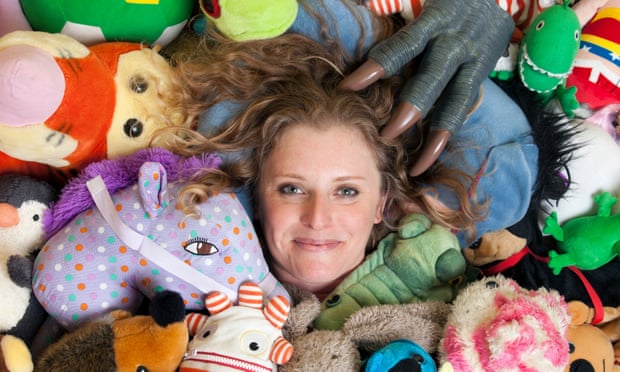‘I’m lovingly angry’: Marianne Levy on why mothers are expected to suffer in silence
A new memoir brings humour to the everyday pain of pregnancy and motherhood

I meet Marianne Levy in a laidback café near her north London home, doorways wide enough to accommodate the bulkiest of buggies, highchairs stacked in a corner, our conversation punctuated by the odd high-pitched shriek or crying jag (not ours). It’s the kind of place, Levy says, mothers on maternity leave tend to meet, “Where normal people don’t want to sit, because it’s got a screaming baby.” This place is a regular haunt for her and her children: an eight-year-old daughter and a son, nearly four. “It’s big and wide and the staff don’t actively hate children, they’re kind to them.”
There’s something a bit pointed about meeting in such a mother-and-child-friendly space to talk about Levy’s memoir, Don’t Forget To Scream, when the book is a heartfelt attempt to break the discourse about motherhood out of this silo, and bring it to a wider and more diverse audience. It’s an unvarnished look at the grimy, lonely, frightening, alienating side of pregnancy and motherhood, spanning birth phobia and physical trauma, the erosion of Levy’s sense of self and self-worth in the early months and years, and the structural, social, economic bind in which so many mothers find themselves. Twenty years since my eldest child was born, it stirred up emotions I had buried, conjuring stultifying, lonely afternoons of quiet pram-pushing despair.
That sounds a bit grim: it’s not. Levy is an engaging, often funny author. She did comedy as an actor in her 20s (though she mainly worked as a voice artist) and she’s a drily witty presence on social media, where I first encountered her. The book is sharp on the infantilising names for baby gear (Bumbo, Dookie, Shnuggle), and the appalling wilful impulses of small children (“You mustn’t shake the abandoned can of Tennent’s into your mouth.”) There’s virtuoso swearing, pet fish psychodrama and a revoltingly accurate taxonomy of the various kinds of filth motherhood involves. She’s good, too, on the dreamy, oxytocin infatuation mothers can feel around babies, the physicality of them, what she calls the “whole minutes of honeyed joy”.
Levy met her husband in her early 30s, at which point she was writing children’s books (she now works as a journalist). They got married, started to try for a baby when Levy was 34 and she became pregnant almost instantly. “I had always assumed I’d have a family,” she says, “and I think I thought I’d crystallise how I felt about that in the trying to have one.” Instead, she was catapulted into an ambivalent, anxious pregnancy and a traumatic five-day labour with lasting physical and emotional consequences. Without family around to help, she found maternity leave lonely and strange.
She felt a sense, too, of failure, both at birth, then at early motherhood. A Cambridge graduate, lifelong hard worker and high achiever, Levy says, “I really struggled with the whole sense of pregnancy and birth being tied up with what kind of person you are. I’m not entirely unsupportive: you go through a really difficult experience and you say, I’m so proud of myself, I did this without pain relief, or I had the birth I wanted… But if you get to be proud of your textbook labour, there must be a flipside, right?” Levy says until then, she had always either been good at things, or: “If I wasn’t good at something, I put my shoulder to it and got better at it. You can’t do that with pregnancy and parenting.”
Levy had a rough time, but in an unexceptional way; she’s absolutely conscious of that. Of her first birth she says: “I read This Is Going To Hurt [Adam Kay’s memoir of his experiences as a junior obs and gynae doctor] and I would not have registered in his day. Completely standard, nothing interesting happened.” That’s sort of the point: Don’t Forget To Scream seeks to challenge the way we minimise and deny how hard the ordinary business of mothering is.
Because during pregnancy, birth, maternity leave and beyond, Levy’s attempts to express what she was feeling were repeatedly shut down. “People got up and walked away,” she says, when she tried to tell them how hard the birth was. “People literally put their hand up and stopped me talking. I found it grimly fascinating. I realised I didn’t have the words to punch through what people thought they were seeing to what was actually going on.” Even among other mothers, she found it hard to express her struggles. Some, she says, had taken years to conceive; one mother in her NCT group had a stillbirth. “‘I conceived my baby in two weeks and now I feel like my life has fallen apart,’ that’s not an easy conversation to have with people you don’t know well, neither of you has slept and you’re both holding a baby that might go off at any moment.” She relates one nervous attempt to communicate her struggles to another mother in the book, screwing up her courage to say how hard she finds staying at home with the baby: “‘Oh’, she said, perplexed. ‘I love it.’ And that was that.”
READ RELATED: M&S worker wins unfair dismissal case after confrontation with maskless shopper during the pandemic
Women’s pain and its trivialisation are another big theme of the book: a chapter called Some Discomfort skewers the weirdly euphemistic and minimising way female pain is treated. A doctor tells Levy pain having sex 18 months postpartum “wasn’t something of concern”; a physiotherapist tells her she isn’t trying hard enough at pelvic floor exercises. “You don’t have ‘dental discomfort!’” she says, indignantly. The fact you get a baby at the end of labour and the way mothers’ pain is described as “worth it” is, she says, “A justification of really shitty care of women. As soon as you say something is ‘worth it’, you’re basically saying you can jump through endless hoops of suffering so long as you’re both alive at the end. At what point is it not worth it? If I die? I don’t know that I’m OK with that.”
Since her first period, Levy writes, she had been introduced to the idea that women’s pain doesn’t matter, but the entrenched unfairness of mothering, the structural absurdity of how we are expected to muddle on uncomplainingly, losing status, economic clout, identity, came as a shock. “I’m a feminist, I literally live in Islington, it’s not going to be a problem,” she thought. Instead, “I felt my narrative as a person had been completely replaced by my narrative as a mother and subsumed by the narrative of my child: I have no discernible personality, wants, needs, nothing that happened to me was of any interest to anyone. I felt that if I wasn’t OK with that – which I obviously wasn’t – it meant that I was a poor mother.” With writing and mothering, she says, “There’s a real sense that if you’re going to do it properly, it has to be front and centre”. By doing both, she automatically felt she was failing and, on top of that, childcare costs meant every time she sat down to write: “I’ve been £90 in debt. I sit down to claw back up to zero.”
Her attempts to articulate her feelings continued to fall on deaf ears: “I said less and less as the years went on, and life got harder and harder,” she says. Now, of course, she has spoken – well, written – and the distinction is crucial. Levy’s second child was born when she was 39, after another difficult pregnancy; he spent time in the NICU, and Levy suffered post-operative infections after her C-section. Again, getting people to understand her feelings seemed impossible. “People kept asking how I was and I remember thinking, I could write something.” She did, posting it online . “It went whoomp,” she says, making an explosive gesture. “It caught fire.” She kept writing on motherhood, occasionally, then Covid happened and another piece – on the impossibility of working, or indeed, having an identity at all as her husband worked full time from another room and she cared for the children – again struck a chord. These essays, the latter written in 40 half-desperate minutes, were the starting point for the book.
Levy is fun company; she likes buying strange second-hand clothes from teenagers on Depop and has a keen eye for the absurd. “My life is ongoingly joyful,” she says. “Even as it’s difficult.” But there’s a vein of anger running through her writing. Is she? “I’m lovingly angry. How can this great expression of love and wonder be so diminished by everyone around us?” Rather, she’s keen to see the full gamut of emotions motherhood involves given the space and the weight they deserve. “You can feel incredible anger and hurt and self-loathing and love and wonder all in a heartbeat and be expected to just carry on.”
Having kept her professional identity scrupulously separate from her mothering life, this book puts the two on a collision course Levy clearly finds unnerving. The spectre of Rachel Cusk, whose memoir of maternal ambivalence, A Life’s Work, was bitterly criticised before attaining contemporary classic status, looms large.
But it’s worth it – that expression again – to shine light on the ordinary, extraordinary difficulty of mothering here and now, especially for non-mothers. “I’m desperate for men to read it; I’m desperate for people without kids to read it,” she says. “For this to be a conversation that breaks beyond the café with the buggies.”
Don’t Forget To Scream is published by Orion on 21 July at £14.99. Buy it at guardianbookshop.com at £13.04
Source: Health & wellbeing | The Guardian








